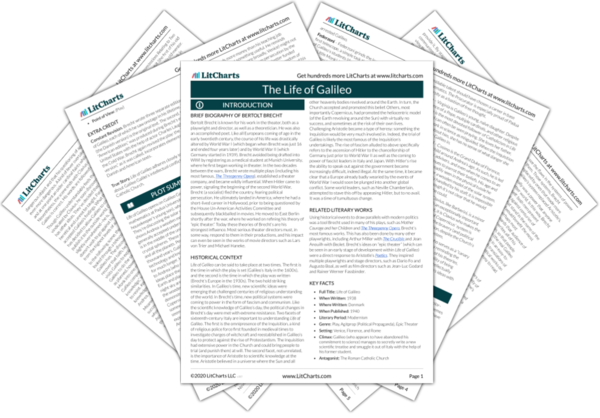Welcome to the LitCharts study guide on Bertolt Brecht's The Life of Galileo. Created by the original team behind SparkNotes, LitCharts are the world's best literature guides.
The Life of Galileo: Introduction
The Life of Galileo: Plot Summary
The Life of Galileo: Detailed Summary & Analysis
The Life of Galileo: Themes
The Life of Galileo: Quotes
The Life of Galileo: Characters
The Life of Galileo: Symbols
The Life of Galileo: Theme Wheel
Brief Biography of Bertolt Brecht

Historical Context of The Life of Galileo
Other Books Related to The Life of Galileo
- Full Title: Life of Galileo
- When Written: 1938
- Where Written: Denmark
- When Published: 1940
- Literary Period: Modernism
- Genre: Play, Agitprop (Political Propaganda), Epic Theater
- Setting: Venice, Florence, and Rome
- Climax: Galileo (who appears to have abandoned his commitment to science) manages to secretly write a new scientific treatise and smuggle it out of Italy with the help of his former student.
- Antagonist: The Roman Catholic Church
- Point of View: (Play)
Extra Credit for The Life of Galileo
Constant Revision. Brecht wrote three separate editions of Life of Galileo, each of which he saw onstage in his lifetime. The first (the Danish version) is the original text. The second, the “American edition,” was produced during Brecht’s exile in the United States with the help of actor Charles Laughton. During the Cold War, Brecht again revised the play: the “Berlin version,” as it was called, incorporates elements of both the Danish and American texts.
True Story. Life of Galileo adheres closely to what is known about Galileo Galilei’s intellectual conflict with the Roman Catholic Church.












